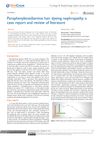 2 citations,
January 2015 in “Elsevier eBooks”
2 citations,
January 2015 in “Elsevier eBooks” The document says biodegradable cosmetics and packaging are better for the environment and user experience.
 9 citations,
October 2018 in “Elsevier eBooks”
9 citations,
October 2018 in “Elsevier eBooks” Nanotechnology is improving drug delivery and targeting, with promising applications in cancer treatment, gene therapy, and cosmetics, but challenges remain in ensuring precise delivery and safety.
[object Object]  17 citations,
August 2002 in “Dermatologic Surgery”
17 citations,
August 2002 in “Dermatologic Surgery” Fluridil safely promotes hair growth in men with androgenetic alopecia.
3 citations,
July 2023 in “International journal of molecular sciences” Stress may contribute to hair loss in alopecia areata by affecting immune responses and cell death in hair follicles.
 August 2002 in “Dermatologic Surgery”
August 2002 in “Dermatologic Surgery” Fluridil safely promotes hair growth in men with androgenetic alopecia.
January 2025 in “Pharmaceuticals” Peptide-based hydrogels are promising for healing chronic wounds effectively.
 January 2019 in “ARC journal of pharmaceutical sciences”
January 2019 in “ARC journal of pharmaceutical sciences” Acne can be managed with various treatments and requires psychological support due to its emotional impact.
1 citations,
April 2023 in “Scientific Reports” Self-assembling RADA16-I hydrogels with bioactive peptides significantly improve wound healing.
63 citations,
February 2017 in “ACS biomaterials science & engineering” Polydopamine is a safe, effective, and permanent hair dye that turns gray hair black in one hour.
 46 citations,
July 1988 in “Journal of The American Academy of Dermatology”
46 citations,
July 1988 in “Journal of The American Academy of Dermatology” Hormone imbalances can cause specific skin changes, which may help in early detection of endocrine disorders.
 162 citations,
August 2002 in “Survey of Ophthalmology”
162 citations,
August 2002 in “Survey of Ophthalmology” Latanoprost can make eyelashes longer, thicker, and darker.
 28 citations,
September 2013 in “Expert Opinion on Therapeutic Patents”
28 citations,
September 2013 in “Expert Opinion on Therapeutic Patents” New resveratrol-related compounds show promise for treating various health issues but need more research for clinical use.
 2 citations,
August 2021 in “Journal of pharmaceutical research international”
2 citations,
August 2021 in “Journal of pharmaceutical research international” Fenugreek seed extract in a nanoparticle gel could be a promising new treatment for hair loss.
[object Object]  7 citations,
December 2011 in “Elsevier eBooks”
7 citations,
December 2011 in “Elsevier eBooks” The document concludes that early diagnosis and treatment are crucial for managing skin diseases in ferrets.
 November 2024 in “Fermentation”
November 2024 in “Fermentation” Fermented ginsenosides from kimchi bacteria may promote hair growth better than finasteride.
 1 citations,
January 2023 in “Journal of Clinical Medicine”
1 citations,
January 2023 in “Journal of Clinical Medicine” A new hair restoration technology was found to effectively increase hair thickness, density, and growth, while reducing hair loss and improving scalp health, with no side effects.
6 citations,
April 2023 in “Cosmetics” Exosomes could be effective for improving skin health and treating skin diseases.
May 2024 in “Molecules/Molecules online/Molecules annual” Plant extracts can help prevent hair loss and promote hair growth.
 30 citations,
October 2015 in “Journal of Ethnopharmacology”
30 citations,
October 2015 in “Journal of Ethnopharmacology” Herbal compounds like ricinoleic acid, quercetin-3-O-rutinoside, and hinokiflavone may be safe and effective for treating hair loss.
 October 2001 in “WORLD SCIENTIFIC eBooks”
October 2001 in “WORLD SCIENTIFIC eBooks” Many substances, including chemicals and metals, can cause skin reactions; careful handling and identification of allergens are crucial to prevent dermatitis.
 4 citations,
September 2015 in “Bulletin of the Korean Chemical Society”
4 citations,
September 2015 in “Bulletin of the Korean Chemical Society” Researchers developed a quick and sensitive method to identify and measure hair growth-promoting substances in a herbal mix.
 September 2023 in “Stem Cells International”
September 2023 in “Stem Cells International” Substances from fat-derived stem cells can promote hair growth and counteract hormone-related hair loss by activating a key hair growth pathway.
 4 citations,
January 2018 in “Urology & Nephrology Open Access Journal”
4 citations,
January 2018 in “Urology & Nephrology Open Access Journal” Hair dye chemicals can cause serious health problems, including kidney damage.
 22 citations,
August 2011 in “Journal of Supercritical Fluids”
22 citations,
August 2011 in “Journal of Supercritical Fluids” Rice bran extract might help prevent hair loss.
 22 citations,
April 1998 in “Dermatologic Clinics”
22 citations,
April 1998 in “Dermatologic Clinics” Interferons are effective for some skin conditions and cancers, but can have side effects and need more research for optimal use.
 8 citations,
July 2014 in “Hair transplant forum international”
8 citations,
July 2014 in “Hair transplant forum international” Bio-enhanced hair restoration, using methods like growth factors, stem cells, and ATP, results in better hair growth and density than traditional hair transplants.
 47 citations,
May 2021 in “Polymers”
47 citations,
May 2021 in “Polymers” Jojoba oil is highly valued for its diverse medicinal and industrial uses.

Autophagy helps activate hair stem cells and hair growth by changing their energy use to glycolysis.
 45 citations,
August 2011 in “Journal of Microencapsulation”
45 citations,
August 2011 in “Journal of Microencapsulation” Chitosan microparticles improve minoxidil sulphate delivery, potentially reducing daily applications.
 39 citations,
April 2011 in “Recent Patents on Drug Delivery & Formulation”
39 citations,
April 2011 in “Recent Patents on Drug Delivery & Formulation” Nanoemulsion-based drug delivery systems are versatile and have potential for treating various medical conditions and improving vaccines.
























